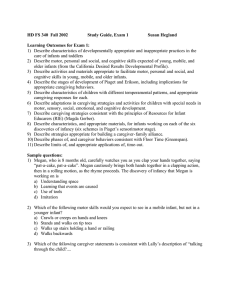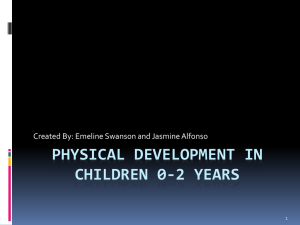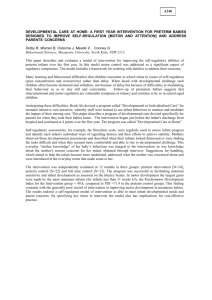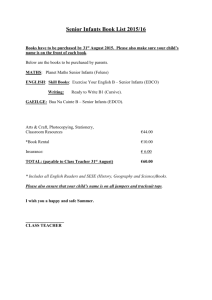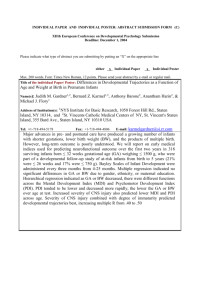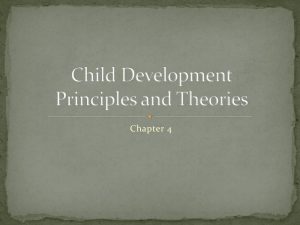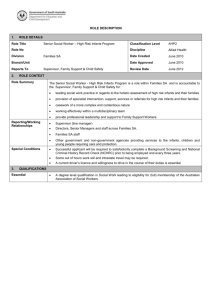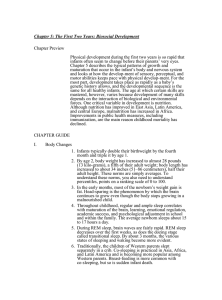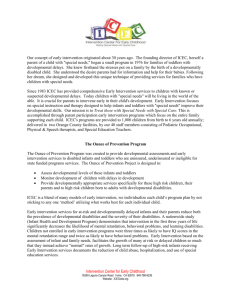Developmental Psychology
advertisement
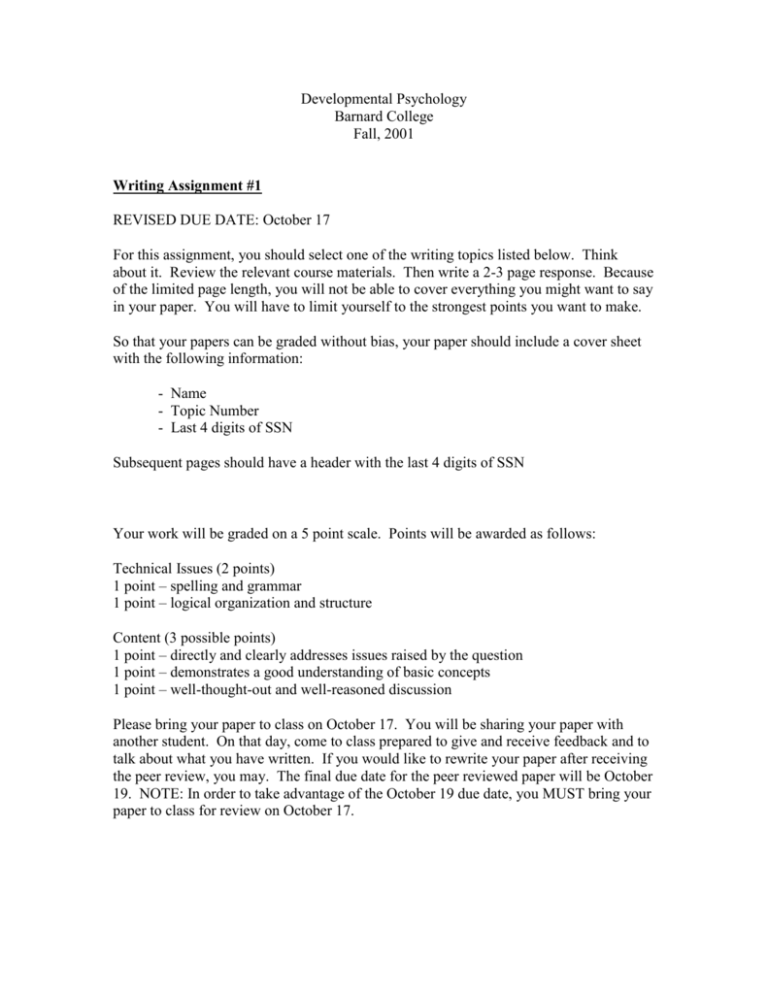
Developmental Psychology Barnard College Fall, 2001 Writing Assignment #1 REVISED DUE DATE: October 17 For this assignment, you should select one of the writing topics listed below. Think about it. Review the relevant course materials. Then write a 2-3 page response. Because of the limited page length, you will not be able to cover everything you might want to say in your paper. You will have to limit yourself to the strongest points you want to make. So that your papers can be graded without bias, your paper should include a cover sheet with the following information: - Name - Topic Number - Last 4 digits of SSN Subsequent pages should have a header with the last 4 digits of SSN Your work will be graded on a 5 point scale. Points will be awarded as follows: Technical Issues (2 points) 1 point – spelling and grammar 1 point – logical organization and structure Content (3 possible points) 1 point – directly and clearly addresses issues raised by the question 1 point – demonstrates a good understanding of basic concepts 1 point – well-thought-out and well-reasoned discussion Please bring your paper to class on October 17. You will be sharing your paper with another student. On that day, come to class prepared to give and receive feedback and to talk about what you have written. If you would like to rewrite your paper after receiving the peer review, you may. The final due date for the peer reviewed paper will be October 19. NOTE: In order to take advantage of the October 19 due date, you MUST bring your paper to class for review on October 17. Topics: 1. In class we observed 16 month old baby Meredith. For this topic, you should complete an observation sheet for a second infant and compare that observation with the observation of Merideth. (You do not have to use Meredith as one of the two infants you observe, you are free to find two other infants, if you prefer.) You may do this assignment in one of two ways: a) Observe two infants (under age 2) who are at different ages (where the infants are at different developmental stages). In your paper you should discuss both your observations of the differences between the infants and the ways that these observations do or do not fit in with relevant theories of development. b) Observe two infants who are about the same age. In your paper you should discuss the similarities and differences in your observations. Include a discussion of how your observations do or do not fit in with relevant theories of development. For this observation, you should focus on only one (or at most 2) of the developmental areas presented on the observation sheet (i.e., motor, cognitive, language, play). However, within the developmental area you discuss, you do not need to restrict your observations to the items listed on the observation sheet. Other relevant observations may be discussed. An additional copy of the observation sheet is included with this assignment. 2. Why is it so difficult to determine how precocious infants really are? In other words, why is it so difficult to determine what knowledge is innate and what knowledge is acquired as a result of experience? Use examples from research on object permanence and/or infant memory to illustrate your points. Be sure to explain your examples and how they inform your argument. 3. In Chapter 6, the work of Harlow is discussed. Review the text for this and other examples of animal research. For this paper you will be focusing on the ethical implications of these studies. In your opinion, do the outcomes of the research in terms of knowledge gained outweigh the ethical concerns? Do some of these studies (or some types of studies) seem more or less objectionable than others? Be sure to include a brief description of any study you discuss. 4. Are there any ways in which you have demonstrated resilience to risk factors in your own life? What protective factors have played a role in your development? Discuss your development as related to these factors in ecological terms using Bronfenbrenner’s framework As relevant, be sure to include a discussion of the following areas: personal characteristics, microsystems, mesosystems, exosystems and macrosystems. 5. You may develop your own topic. If you wish to do so, please submit the topic to me for approval by October 12. If you develop your own topic, please include in your paper an additional page describing the topic in full. Infant Observation Sheet (to be used for topic #1) Infant’s Name: Birth: Full-Term? Age: Premature? Gender: If premature, how early? Motor Skills: GROSS MOTOR FINE MOTOR Lifts head up – reaches for object - Rolls over – can coordinate reaching and grasping (with effort) - Sits without support – Pulls self to stand – Walks holding onto furniture – well-coordinated reaching and grasping (appears automatic) uses pincer (thumb and finger) to pick up small items - Walks with help Walks well – Can build a tower of blocks (how many)? Walks up steps – Uses a spoon - Kicks ball forward – Uses a ball (rolling? throwing?) - General observations: General observations: Object Permanence Tasks (Cognitive Development): Searches for hidden object – Makes A not B error – Looks for displaced object – General observations: Language Comprehension and Speech: SPEECH Cooing – Babbling – Responsive cooing and babbling (baby conversation with turn-taking) Jargoning (babbling that sounds like speech, with appropriate intonations) – Single words – Puts 2 words together – COMPREHENSION Recognizes own name – Responds appropriately to some basic requests/commands/suggestions – Understands most simple speech – General Comments: Play Secondary circular reactions – Tertiary circular reactions – Peek-a-boo – Imitative play – Using objects the “right” way (e.g., hammering with a hammer) – Symbolic play (substituting one object for another, e.g., pretending a rake is a comb or a block is a car) General Comments:
